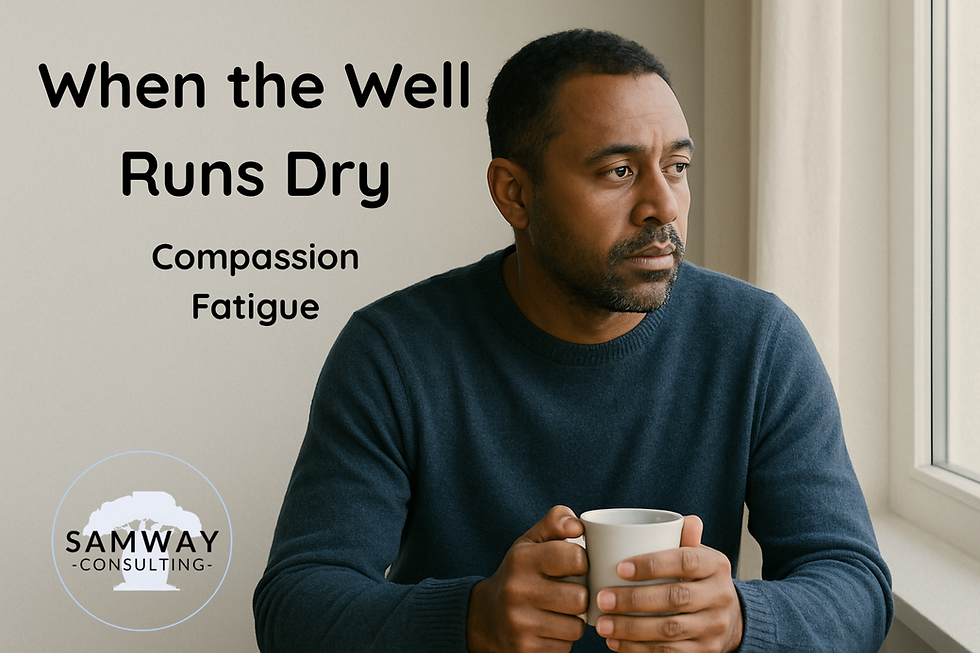Grieving From a Distance (When THAT Phone Call Comes)
- Wayne George

- Feb 16, 2021
- 3 min read

I was awoken in the early hours of 18th July 2019 by my buzzing phone next to my bed. The Caller ID showed a South African number…I knew instinctively that this was THAT call…that call that every immigrant dreads…
For me it was sad news as the voice on the other end, that of my eldest sister’s, broke the news “Mommy is gone…” It was a call that I knew would come someday…that someday was now here. (10 months later I would receive another one of THOSE calls, this time about the very sister that had phoned me to tell me about Mom…”Charl has left us…”).
When one makes the move overseas, the unwritten clause in the ‘fine print’ is that that call will come someday. The question this article addresses is not how to avoid that call – it is unavoidable and inevitable – but rather how to respond to that call when on the other side of the world.
How does one say goodbye without being able to stand by the graveside of one’s departed loved one?
How does one grieve from a distance and attain that much sought after ‘closure’?
Is this even possible.Well, in a nutshell, the answer is ‘Yes;’ it is possible to grieve from a distance, however, the reality is that grieving will look different, it may feel different, not radically different but different, nonetheless.
1. Absence of Physical Reminders
Because one is far removed from the situation, one is removed from the physical ‘in-your-face’ reminders.
- You are not seeing the empty seat at the dinner table.
- You are not there to see the favourite dress that will never be worn again.
- You’re not there to sort out the earthly possessions and pack up a lifetime of memories in a box.
Is this a good thing – that one does not have to ‘deal’ with these reminders? Or is it a hurdle that hampers/hinders one’s healing heart? That’s a question only you, as an individual can answer.
2. Not Being Part of the Process
No doubt, deaths in families have the potential to bring families together, not only physically but also emotionally. Often, irrespective of differences and distances over the years, the death of a loved one, in many cases, causes the ‘feuding weapons’ to be laid aside at least for a while, as everyone pulls together to support one another and as a final gesture of love for the deceased, contribute time, finances and resources to making the funeral service one that does justice to the memory of one’s beloved.
However, what’s missing from the beautiful picture of solidarity? Who is not able to make his/her contribution as ‘effectively’ as those present? It’s you…it’s me…it’s the countless number of immigrants the world over who could not make it home neither to give, nor to receive the family support as much as one would have like to. How are you dealing with that?
3. Unable to Attend Funeral Service
If cost is not a factor for one to hop on a plane and make the journey back home to attend the funeral, then certainly in our modern day, a global pandemic is. International travel is pretty much shut down. The irony is the very pandemic that is giving rise to increased funeral services the world over is the very same thing preventing loved ones from attending those funeral services, due to travel restrictions and social distancing requirements.
Once again, one of the very physical acts of ‘saying good-bye’ – funeral attendance – one is deprived of by the double-edged sword of pandemic and immigration. How do you deal with this? Given, technology helps – Facebook live, Zoom, etc.…but is this good enough for you in your journey to wholeness? Or is further processing needed once the laptop is shut down?
Grief is real; grieving is necessary; grief is very personal and varies from person to person – some may need several weeks, for others it may take years. Some, or all, of the various stages of grief may be experienced, including:
An added aspect for the grieving immigrant is guilt.
Guilt over not being there;
guilt about not saying goodbye,
guilt about the load having to be carried by other members of the family who are present.
May this guilt, however, not overshadow your season of grieving. The truth about grieving from a distance is that indeed it will look different, it may feel different, not radically different but different, nonetheless.
If you decide you need help coping with the feelings and changes of having to ‘grieve from a distance’ then speaking to a Counsellor is a good resource for processing your feelings and finding a sense of assurance in these very heavy and weighty emotions.
Make contact with Samway Counselling Services today and let us journey together.






Comments